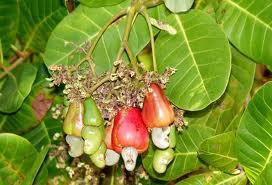 Cashew
Cashew
Dr. Gideon Agbley, Executive Member of the Cashew Industry Association of Ghana has recommended the establishment of a cashew development levy to finance the industry and enable it to function effectively.
The Association is of the view that government should allocate 2.5 to 5 per cent of its revenue to the industry to be used to subsidize the production of seedlings to plant more and buy equipment for the processors.
This, the Association believed, was critical because the industry if well prioritize would generate revenue for the country through exports, as well as create job opportunities for the unemployed.
Dr Agbley made the recommendation during a panel discussion in Accra on the Ghana Journalists Association programme dubbed “Business Advocate” on Ghana Television. It is supported by BUSAC Fund, DANIDA, United States Agency for International Development and the European Union.
Dr Agbley said Cote d’Ivoire had instituted such a levy for its cashew industry and had improved the sector, and that the Ivorian cashew industry was producing 10 times more than Ghana’s and was also able to compete on the global markets.
Making a presentation on the topic, “Support for the Cashew Industry in Ghana: Prospects and Challenges”, he said the Association was a non-governmental organization established in August 2012 and registered in September 2013.
He said the Association was an umbrella body of players within the cashew supply chain with the aim of organizing the entire industry in Ghana into major groupings including Producers, Processors, Traders, and Service providers.
The Association collaborates with farmers, processors and research agencies such as the Cocoa Research Institute of Ghana and the Wenchi Agric Research Centre, as well as international agencies such as the African Cashew Initiative (ACI) and African cashew Alliance, Dr Agbley added.
He said the sector could become one of the most promising contributors to economic growth for the country if it was given the needed attention, as it contributed between 400 million and 500 million dollars in revenue to the national economy.
It is estimated that the crop increased from its current 50,000 to 200,000 metric tonnes annually with a processing capacity of about 90 per cent and that the sector currently had 14 processing factories within the country with a processing capacity of 60,000 MT, while the country produces 50,000 MT of raw nuts.
“This among other factors contributes to the need for an effective dialogue between the government of Ghana and agencies responsible for the implementation of policies that will help promote the sector”, he added.
Dr Agbley urged government to streamline the value chain process by putting in place standards, regulations and licensing system to prevent foreigners from taking undue advantage of the process to buy from the farmers at a cheaper price.
Mr Seth Osei Akoto, Deputy Director for Crops and Cashew at the Ministry of Food and Agriculture (MOFA) said the Ministry was coordinating with stakeholders to promote the development of cashew in the country.
Mr Akoto said the Ministry had introduced the ‘Improve Processing seeds’ to farmers to increase the production of cashew seedlings and create opportunities for the local industries as well as investors.
He said even though the country currently had 12 primary cashew processing units with a total installed processing capacity of 65,890 MT in 2015, the industry was only able to process 5,230 MT of raw cashew nuts per year, representing 7.9% of its total capacity.
Mr Akoto said the Ministry was ready to support the production of cashew in the country and urged interested individuals or organizations to visit the MOFA office for discussions so as to chart the path for the development of the industry.
Ms Mary Adzanyo, Director of Private Sector Development at the African Cashew Initiative believed that the production of cashew should be seen on a global perspective and that the total global production of the sector is 38 per cent.
Ms Adzanyo said African governments should give priority attention to the sector and increase its competitiveness since the industry’s demand was huge and had a great economic potential for the continent.
She said the ACI was established to support cashew production in the sub-region, urging stakeholders to think globally and learn from the experiences of other countries. They should also create the enabling environment for public-private investment.
Mr Papa Kow Bartels, Director, Logistics and Value Chain at the Ministry of Trade and Industry said the Ministry had recognized the pivotal role played by the industry and was pursuing the export programme to explore strategies to have maximum dividend for the export industry.
He noted that the Ministry was expanding the demand and supply base, as well as manpower and institutional development to drive the industry to the level of efficiency.